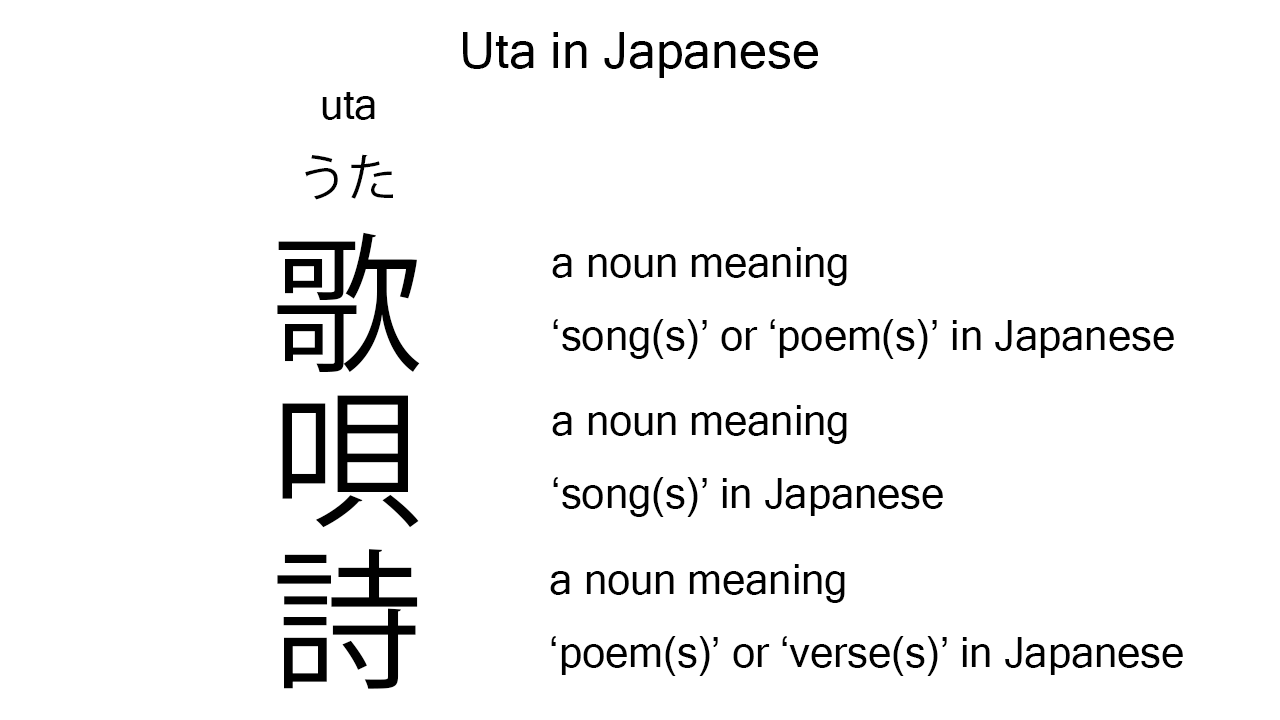What does “uta” mean in Japanese?
Native speakers say “uta” to mean ‘song’, ‘poem’, or ‘verse’ in Japanese. Perhaps, some Japanese learners know this word as it is sometimes used in Japanese movies, songs, novels, manga, anime, and the like. In this blog post, however, I will explain this word together with its different kanji expressions. And also, I will explain how to use it through example sentences. My explanations would help Japanese learners understand “uta” more clearly. Then, let’s get started!
Contents
Definition and meanings of “uta”
Let me start with the definition and meanings of “uta”.
- uta – 歌/唄/詩 (うた) : a noun meaning ‘song’, ‘poem’, or ‘verse’ in Japanese. This can also work as plural. Learn more about Japanese plural.
“Uta” has three different kanji expressions: 歌 means a ‘song’ or ‘poem’; 唄 means a ‘song’ too, but this expression is more suitable for traditional songs; 詩 means a ‘poem’ or ‘verse’ in Japanese. In most cases, however, we can focus on the first kanji expression. It is the most widely used one.

The definition and meanings are not that difficult, I think. Then, let me explain how to use this noun through the example sentences below.
Example #1: how to say “song” in Japanese
boku wa kono nihongo no uta ga suki desu – 僕はこの日本語の歌が好きです (ぼくはこのにほんごのうたがすきです)
I love this Japanese song.
Below are the new words used in the example sentence.
- boku – 僕 (ぼく) : a pronoun meaning ‘I’ in Japanese. This is used mainly by boys and young males.
- wa – は : a binding particle working as a case marker or topic marker. In the example, this works after “boku” to make the subject in the sentence.
- kono – この : a determiner used before a noun referring to a thing close to the speaker. In the example, this is used before “nihongo no uta” to say “this Japanese song” in Japanese.
- nihongo – 日本語 (にほんご) : a noun meaning ‘Japanese’ or ‘the Japanese language’ in Japanese.
- no – の : a case particle joining two nouns. Normally, the first one can work as a modifier to describe the second. In the example, this works to join “nihongo” and “uta”. The formed phrase literally means a ‘Japanese song’ in Japanese.
- ga – が : a case particle used to make the subject word or the object word in a sentence. In the example, this is used after “kono nihongo no uta” to make the object in the sentence.
- suki – 好き (すき) : the stem part of the na-adjective, “sukina”, which means ‘favorite’ in Japanese. Native speakers, however, often use this as an individual word to mean ‘to like’ or ‘to love’ in Japanese. In the example, this is used to mean ‘to love’.
- desu – です : an auxiliary verb used after a noun or adjective to make it polite. In the example, this is used after “suki” to make it sound polite.
This is a typical usage of “uta”. In this example, it works as a part of the noun phrase, “kono nihongo no uta”, which means ‘this Japanese song’ in Japanese.
Example #2: another usage of “uta”
watashi wa yoku uta wo utau – 私はよく歌を歌う (わたしはよくうたをうたう)
I often sing songs.
Below are the new words used in the example sentence.
- watashi – 私 (わたし) : a pronoun meaning ‘I’ in Japanese.
- yoku – よく : an adverb of frequency meaning ‘often’ in Japanese.
- wo – を : a case particle used to make the object word in a sentence. In the example, this is used after “uta” to make the object in the sentence.
- utau – 歌う (うたう) : a verb meaning ‘to sing’ in Japanese.
This is another typical usage of “uta”. In this example, it works as a part of the commonly-used phrase, “uta wo utau”, which means ‘to sing songs’ in Japanese. When we want to mean ‘song’ or ‘songs’ in Japanese, anyway, this noun is always a very good option.
Summary
In this blog post, I’ve explained the definition and meanings of “uta” together with its different kanji expressions. And also, I’ve explained how to use it through the example sentences. Let me summarize them as follows.
- uta – 歌/唄/詩 (うた) : a noun meaning ‘song’, ‘poem’, or ‘verse’ in Japanese. This can also work as plural. This noun has three different kanji expressions: 歌 means a ‘song’ or ‘poem’; 唄 means a ‘song’ too, but this expression is more suitable for traditional songs; 詩 means a ‘poem’ or ‘verse’ in Japanese. In most cases, however, we can focus on the first kanji expression. It is the most widely used one.
Hope my explanations are understandable and helpful for Japanese learners.